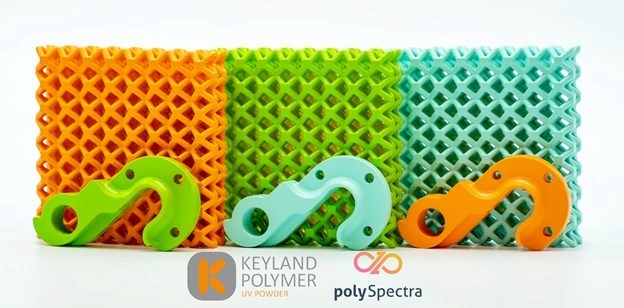Keyland Polymer, polySpectra combine photopolymers, powder coatings to advance 3D printing
UVMax powder coatings provide a spectrum of surface color and texture possibilities, while COR Alpha photopolymers have been refined for durability.

COR Alpha 3D-printed parts using UVMax powder coatings. Photo Credit: Keyland Polymers, polySpectra
Keyland Polymer (Cleveland, Ohio, U.S.) and (Berkeley, Calif., U.S.), a producer of functional photopolymer resins for additive manufacturing (AM), have formed a strategic partnership to provide UVMax powder coatings — targeted at a composites fabrication environment — to COR Alpha 3D-printed parts. COR Alpha is a photopolymer that is rugged under pressure and stands up to solvents. This collaboration is said to unlock a new modular approach to AM, enabling the direct digital fabrication of end-use polymer components for a wide variety of applications.
According to both companies, the surface color and texture of the UVMax coating can be tailored to make COR Alpha 3D-printed parts indistinguishable from traditionally manufactured polymer products. engineering-grade photopolymers have been refined to offer best-in-class thermomechanical performance and durability, whether for consumer products, to medical devices to satellite parts. COR Alpha’s high thermal stability of COR Alpha also enables thorough and complete coating without the concern of warping or degrading the material.
Alternately, coating provides a spectrum of color possibilities, providing an excellent finish for lightweighting applications, transportation, building materials, consumer and industrial products. Keyland says it can develop a wide range of powders to match any supplied color standard. UV powder is an environmentally friendly coating, containing no solvents, VOCs or HAPs. It is safe to use and can be reclaimed and recycled.
Related Content
-
Hybrid process marries continuous, discontinuous composites design
9T Labs and Purdue applied Additive Fusion Technology to engineer a performance- and cost-competitive aircraft bin pin bracket made from compression-molded continuous and discontinuous CFRTP.
-
Urban furniture project demonstrates green potential for composite 3D printing and recycled materials
Large-format AM specialist Caracol and partners designed custom, 3D-printed outdoor furniture with glass fiber-reinforced recycled polypropylene, and conducted an LCA to evaluate and improve the process.
-
Combining multifunctional thermoplastic composites, additive manufacturing for next-gen airframe structures
The DOMMINIO project combines AFP with 3D printed gyroid cores, embedded SHM sensors and smart materials for induction-driven disassembly of parts at end of life.



